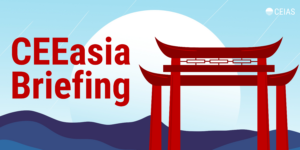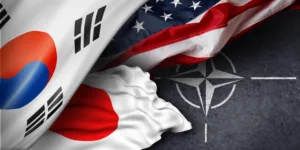Welcome to the 21st issue of the #CEEasia newsletter.
In this issue, we dissect the following topics:
- Fudan University campus in Hungary
- Taiwan & CEE countries
- Sinopharm vaccine factory in Serbia
- South Korea defense cooperation with Poland
If you like what you see, please forward this message to your friends and colleagues who can subscribe here.
Do you need to know more about East Asia? Don’t hesitate to shoot us a message about custom analysis tailored to your needs.
1. Hungary to decide the fate of the Fudan University campus by referendum
What’s going on? The issue of establishing a new overseas campus of the Shanghai-based Fudan University in Budapest has been dominating the political discussion in Hungary for a few months now. After thousands took to the streets of Budapest in June to protest the Chinese university’s expansion into the Hungarian capital, Prime Minister Viktor Orbán appeared to support a referendum on the matter.
Digging deeper… Budapest’s Mayor Gergely Karácsony and other officials have long urged the government not to proceed with the project backed by the Hungarian taxpayers’ money and a 1.6 billion-dollar loan from a Chinese bank while proposing a referendum on the fate of the campus. Although the opposition’s proposal to hold the referendum was approved by the National Election Committee, it is expected to happen only after the final plans for the campus are made public by the end of 2022.
This means… Orbán’s “Eastern opening” policy and efforts to further develop Sino-Hungarian relations seem to have clashed with public discontent with regard to the Fudan project. However, only next spring’s parliamentary election will tell whether Karácsony’s policy preferences and stance towards China are more in line with the popular sentiments and enough for him to replace Orbán.
Further reading:
CEIAS: Hungarian public opinion on China in the age of COVID-19
SCMP: Hungary’s Viktor Orban will support referendum on plan to host Chinese university campus
RFE/RL: Hungary’s Election Authority Approves Bid To Hold Referendum On Chinese University

We have launched CEIAS Considers, a new weekly publication in which regional experts from the CEE and further abroad tackle the key developments in East Asian and Indo-Pacific affairs. The article series is edited by David Hutt, a CEIAS Research Fellow and a seasoned journalist who regularly contributes to The Diplomat, Asia Times, with publications also in Foreign Policy, Nikkei Asian Review, South China Morning Post and other international publications.
In the very first issue, experts were asked to chime in on why China ending its construction of overseas coal-fired power stations could be a big issue for world politics.
Read the hot takes on this by Richard Q. Turcsanyi, Mirela Petkova, and Nikita Odintsov on our website. Read here
2. Taiwan’s blossoming relations with the CEE
What’s going on? After receiving vaccine donations from Lithuania, Slovakia, and Czechia, Taiwan is sending a 65-person delegation to the three countries in October to boost trade and investment relations between Taiwan and CEE. Poland has also donated 400,000 AstraZeneca doses to Taiwan, making it the third-largest donor after the US and Japan. In addition, the Polish Minister of Foreign Affairs criticized China’s coercive tactics against Lithuania, as seen most prominently in the ambassador recall fiasco, and the country is now trying to boost its own ties with Taiwan, especially in the area of electric vehicles.
Digging deeper… In addition to its original pledge of 10,000 vaccine doses, Slovakia recently increased the amount up to 160,000 doses. Similarly, Lithuania announced a donation of further 235,900 doses, showing its determination to withstand China’s coercion.
Slovakia and Taiwan also signed a bilateral Arrangement on Judicial Cooperation in Criminal Matters which, among other things, provides for reciprocity in extraditions. In early September, Slovakia also became the fourth European country to participate in the Global Cooperation and Training Framework (GCTF), a joint initiative by the US and Taiwan that was established in 2015 as a platform for Taiwan to share its expertise on issues of global concern. The workshop Slovakia co-hosted focused on labor issues during the post-COVID economic recovery.
This means… This however does not mean that more EU countries will take a Taiwan-friendly stance. The European Parliament has long been voicing its support for Taiwan. Most recently it has called for the EU-Taiwan Bilateral Investment Agreement (BIA) and renaming of the European Economic and Trade Office in Taiwan to the European Union Office in Taipei in its draft report on the EU-Taiwan relations. Several chairs of Foreign Affairs Committees across different European countries as well as the Slovenian Prime Minister Janez Janša, who currently holds the presidency of the Council of the European Union, also condemned China’s coercion towards Lithuania. Nevertheless, as suggested by MERICS analysts Francesca Ghiretti and Grzegorz Stec, the EU has, unlike the US, refrained from explicitly endorsing Lithuania’s position, and the reactions of separate member states have thus far been relatively muted.
Further reading:
CHOICE: Taiwan, Lithuania, and a Small Country’s Big Challenge to Beijing
Taipei Times: Slovakia joins GCTF conference
MERICS: EU-Taiwan relations gather momentum, but breakthrough remains elusive
3. Sinopharm vaccine factory in Serbia
What’s going on? Whilst the Chinese vaccines Sinopharm and Sinovac are facing efficacy issues all over the world, Serbian President Aleksandar Vučić laid the foundations of the Sinopharm production facility in Belgrade. The factory, which was announced as a joint investment project by Serbia, China, and the UAE earlier in the year, is planned to open by March 2022 and produce around 30 million doses per year. Similarly, the Hungarian government signed a letter of intent to develop the required infrastructure for its domestic production of the Sinopharm vaccine within the next ten months and start the factory construction by the end of 2022.
Digging deeper… Nevertheless, unlike in Budapest where the public is becoming increasingly wary of China, as seen in the recent protests against the Fudan University campus, the same does not apply to Belgrade. According to the CEIAS & Sinophone Borderlands report mapping the public opinions of China across Europe, Serbs have a decisively positive view of China, which has, contrary to the rest of Europe, improved during the COVID-19 pandemic. Indeed more than two-thirds of Serbs believe that vaccines from Russia and China are more reliable than those from the West. This shows the success of the pro-China narrative pushed by the political elites, who are now hoping to ride on the wave of the country’s earlier vaccine diplomacy and transform Serbia into a regional supply hub for the COVID-19 vaccines.
This means… Such plans can however be hindered by the fact that the country, which once had the second-fastest vaccination rate in Europe, is now lagging behind the EU in its vaccine rollout. It is unclear whether the Sinopharm’s efficacy issues contributed towards the rising anti-vaccination sentiments, especially considering that such sentiments are common across Central and Eastern Europe. Nevertheless, Serbia’s relations with China are unlikely to subside anytime soon, complicating the EU’s efforts to take on a bigger role in the region. The relations are also worrisome in light of the recent study published by the Center for the Study of Democracy that links China’s rising economic footprint to the deteriorating governance standards, especially in the Western Balkan region, taking countries further away from their EU accession pathways.
Further Reading
CEIAS: Serbian public opinion on China in the age of COVID-19
CHOICE: It’s Smooth Sailing for Sinopharm in Serbia
RFE/RL: New Study Says China Using Investments to Buy Political Influence in Central, Eastern Europe
4. South Korea and Poland to boost defense cooperation
What’s going on? South Korea is continuing its efforts to strengthen security cooperation with the countries of Central Europe. The meeting between the State Secretaries of the Ministries of Defense of the Republic of Korea and Poland concluded with a memorandum to strengthen defense exchange and cooperation, in which the Poles expressed their interest in focusing primarily on cybersecurity.
Digging deeper… South Korea has long sought to win a contract to supply military equipment, specifically the Korean K2 main battle tank, which is being developed by the State Agency for Defense Development and Hyundai Rotem. Apart from the Poles, representatives of South Korea discussed the offer of the tank, the prototype of which was unveiled in 2007, with the Slovak State Secretary of the Ministry of Defense, Marián Majer, at the beginning of the year. The Slovak Republic, which has to build a heavy mechanized brigade according to its commitments to NATO, will have to modernize its tank army, and a Korean tank, which is lighter than other tanks in this category, would appear to be a suitable replacement for the Slovak Armed Forces. However, the most promising is the possibility of exporting tanks to Poland. The value of the deal for adjusted tanks is estimated at around $9 billion.
This means… South Korea is established in Central Europe as a major economic partner and investor. Amongst the V4 countries, Poland presents itself as a Korean gateway to Europe, with cooperation in the areas of logistics, energy, and defense strengthening ties between the two countries. However, South Korea is seeking similar efforts in other regional countries. In the Czech Republic, it is bidding for a tender for the construction of a nuclear power plant, whereas in Slovakia it is offering tanks. South Korea’s efforts seem to be paying off in the form of a promising position for a number of projects, but these have yet to be decided. Nevertheless, these efforts must be seen as an opportunity for the CEE countries to strengthen a partnership with South Korea, but also as an example for the other countries of East Asia.
Further Reading
The Korea Herald: S. Korea, Poland agree to strengthen defense ties in vice-ministerial talks
CZDefence: Meeting with Korean Representatives: Chance for the K2 Tank in Slovakia?
Emerging Europe: Why Poland is South Korea’s gateway to the EU







